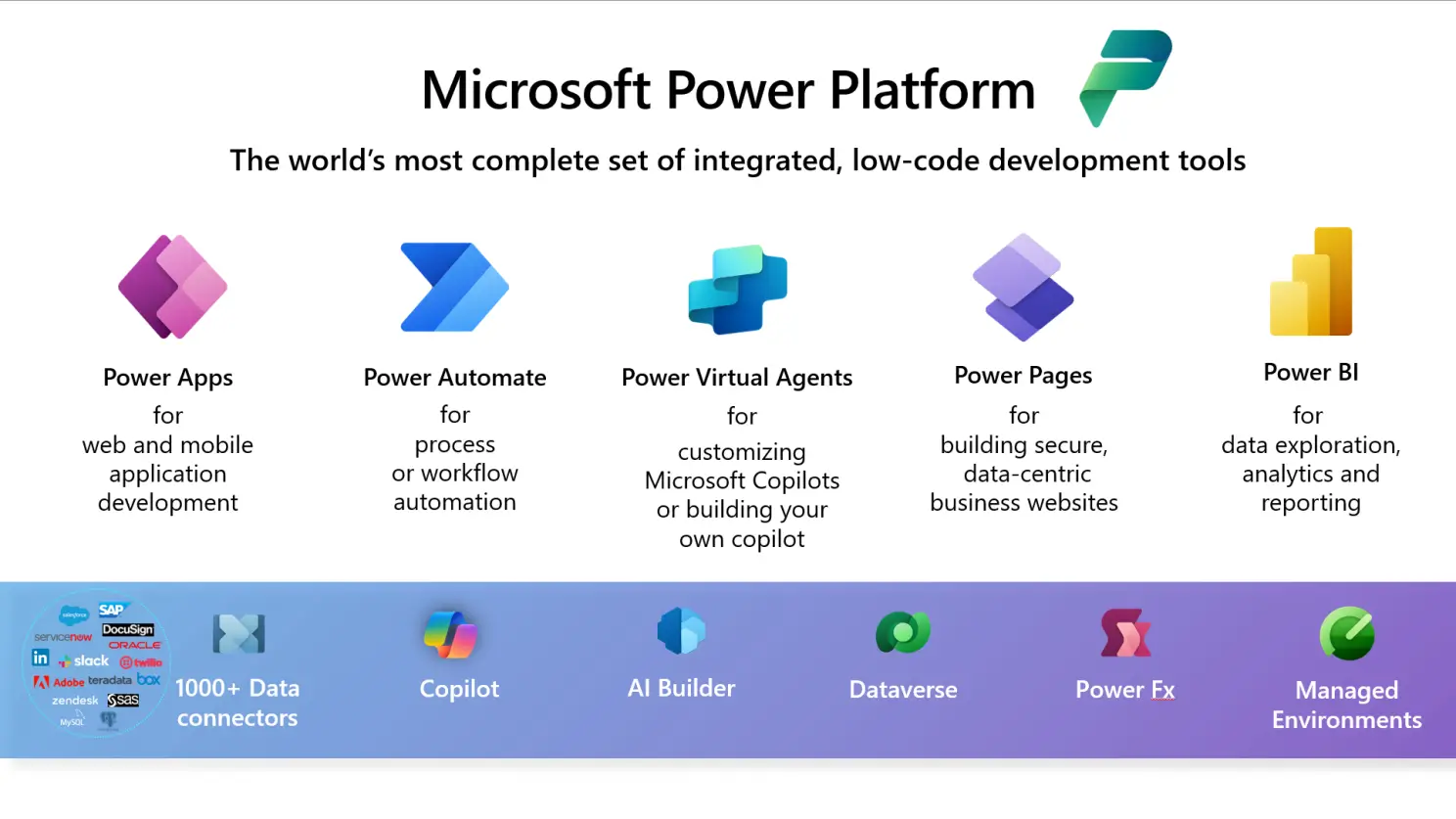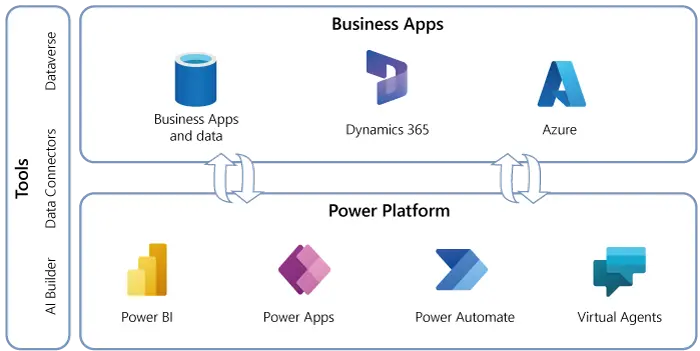Introduction to Microsoft Power Platform
 Abhishek Dhoriya
Abhishek DhoriyaTable of contents
- Introduction
- Microsoft Power Platform A Comprehensive Overview
- Microsoft power platform architecture the design that empowers
- Microsoft Power Platform Architecture
- Microsoft power platform certification your gateway to expertise
- Power platform vs power apps a comparative analysis
- Microsoft power automate streamlining your business operations
- Microsoft power apps fueling digital innovation
- Become an expert a glimpse into the power platform tutorial
- Conclusion

Microsoft Power Platform is a low-code platform that empowers organizations to analyze data, act on it through applications, and automate business processes. It’s designed to be used by everyone, from professional developers to frontline workers, to drive better business outcomes.
Introduction
In an era where businesses are increasingly dependent on technology, discovering transformative solutions that streamline processes, boost productivity, and pave the way for intelligent decision-making is paramount. Enter Microsoft Power Platform – a versatile, comprehensive, and robust collection of apps that promotes a productive environment for businesses of all types and sizes.
The world of business technology is evolving at lightning speed. Amidst this transformation, the Microsoft Power Platform stands strong, carving a colossal footprint as a powerful tools suite that bridges the gap between businesses and technology. Immerse yourself in the captivating dynamics of Microsoft Power Platform, decipher its intrinsic architecture, delve into its impact, tutorial, and certification, as well as explore the potential that lies within its apps. Let's delve deep into understanding this dynamic tool designed for modern businesses.
Microsoft Power Platform A Comprehensive Overview
Microsoft Power Platform is a powerful suite of productivity tools comprising Power BI, Power Apps, Power Automate, and Power Virtual Agents, each contributing to your business in unique ways. Power Platform not only enhances efficiency but also democratizes access to intuitive tools, enabling everyone to analyze data, build solutions, automate processes, and create virtual agents without complex coding experience.
Fundamentally, Microsoft Power Platform is a robust business solution that amalgamates four Microsoft products: Power Apps, Power Automate, Power BI, and Power Virtual Agents. These elements work synergistically, empowering users to analyze data, build solutions effortlessly, automate processes, and create chatbots using a simplified, user-friendly interface.
No conversation about Microsoft Power Platform can be complete without a mention of Dynamics 365. Essentially, Power Platform adds to the capabilities of Dynamics 365, enabling users to customize, extend, and build new applications rapidly.
Microsoft power platform architecture the design that empowers
The cohesive force binding the Microsoft Power Platform is the Common Data Service (CDS), a unified secure data store. CDS empowers users by allowing applications to leverage a single source of business data logic. This centralized data management system eliminates data siloes, enabling streamlined integration and easy access to business data from various sources.
Permission settings at different levels ensure high-level data security, maintaining solid control over who can see and access the data. The system makes it possible to create rich, interactive data visualizations via Power BI all from a common platform.
Microsoft Power Platform Architecture

Components of Power Platform The Power Platform comprises four main Microsoft products: Power BI, PowerApps, Power Automate (previously known as Microsoft Flow), and Power Virtual Agents.
Power BI Power BI is a business intelligence tool that enables data analysis and communication of insights. It includes a desktop application for report development and a cloud service to host and share reports and dashboards.
Power Apps Power Apps is a low-code platform for custom application development. Its user-friendly interface allows both business users and developers to create applications.
Power Automate Power Automate is a workflow automation tool that helps automate repetitive processes, such as data collection and document approvals.
Power Virtual Agents Power Virtual Agents is a tool to develop and deploy chatbots in a low-code environment.
Benefits of Power Platform Utilizing the components of the Power Platform allows organizations to analyze data and deliver insights, build low-code solutions, automate business processes, and assist with inquiries using chatbots.

Additional Resources The article also provides links to two courses for those interested in becoming a Microsoft Dynamics 365 Developer.
The architecture of Microsoft Power Platform combines the prowess of different applications into a unified framework. It integrates easily with Microsoft's other offerings like Dynamics 365, Microsoft 365, and Azure, creating a seamlessly interconnected environment. This integration promotes data transparency, ease of access, and efficient decision-making, positioning your business at the forefront of the digital revolution.
Microsoft power platform certification your gateway to expertise
Ready to amplify your professional prowess with Microsoft Power Platform? Microsoft offers specific certification paths that validate your ability to build and implement solutions using Power Apps, Power Automate, Power BI, and more. The certification can go a long way in bolstering your credentials and intensifying your career growth.
Microsoft Power Platform Certification is a recognized validation of your proficiency with the platform. Whether you are a developer, an administrator, or a data analyst, earning a certification equips you with the skills and knowledge needed to harness the platform's full potential effectively. Microsoft offers multiple Power Platform certifications, each targeting different roles and proficiency levels in the industry.
Power platform vs power apps a comparative analysis
Microsoft Power Apps is a pivotal component of Power Platform, enabling users to develop custom, no-code apps that enhance business efficiency.
While Microsoft Power Apps is an integral part of the Microsoft Power Platform, offering businesses the ability to create custom apps with zero or minimal code, Power Platform extends beyond just Power Apps. It includes Power Automate, Power BI, and Power Virtual Agents, and forms a total ecosystem for enterprise analytics and data visualization.
In comparison, Microsoft Power Platform represents a comprehensive suite, including, besides Power Apps, tools like Power BI, Power Automate, and Power Virtual Agents. Thus, while Power Apps focuses on application development, Power Platform delivers an integrated, holistic solution for businesses.
Microsoft power automate streamlining your business operations
As part of the Microsoft Power Platform, Power Automate provides an efficient way to automate routine, time-consuming tasks. By creating automated workflows between applications and services, Power Automate improves productivity, reduces errors, and allows your workforce to focus on more strategic, value-added tasks.
Microsoft Power Automate, formerly known as Microsoft Flow, is a key element of the Power Platform. It allows users to automate business processes by building secure workflows across applications and services. Users can set up triggers, alerts, automated emails, push notifications, and much more, replacing repetitive tasks.
Microsoft power apps fueling digital innovation
Microsoft Power Apps is a game-changing aspect of Power Platform, empowering businesses to swiftly create custom apps even with limited coding knowledge. Regardless of complexity, Power Apps accelerates your business’s digital transformation journey, fostering efficiency, collaboration, and innovation.
Microsoft Power Apps has sparked revolutionary changes in the way businesses operate, enabling teams to create tailor-made, no-code apps swiftly. The versatile Power Platform Apps widen the horizon for businesses, allowing them to design and develop applications catering to specific requirements effectively.
What is Power Platform Used for?
The Microsoft Power Platform is instrumental in,
Simplifying app creation with Power Apps
Facilitating data-driven decision-making with Power BI
Promoting business efficiency with Power Automate
Enhancing customer service with Power Virtual Agents
Become an expert a glimpse into the power platform tutorial
Microsoft has developed an array of comprehensive Power Platform tutorials, steering your learning journey. From understanding basics to advanced concepts, these tutorials gear you towards mastering the platform and enhancing your business workflow.
Venture into the dynamic world of Power Platform through a comprehensive Power Platform tutorial. Cortana's interactive guides, video sessions, and in-depth tutorials are designed to handle queries and guide you through the process of getting started with Power Platform.
Conclusion
In conclusion, the Microsoft Power Platform is a revolutionary suite of tools designed to transform the way businesses operate in today's digital age. It offers businesses the liberty to build data-driven, effective solutions, regardless of size or industry. As it continues to grow and evolve, the Power Platform will undoubtedly remain at the forefront of productivity solutions, perpetually empowering organizations to achieve unprecedented efficiency. Embrace this transformative tool, and drive your enterprise towards sustainable, long-term success.
Microsoft Power Platform is dynamically transforming the business tech landscape by offering a comprehensive toolbox that democratizes access to tech-based solutions. Its user-friendly and powerful tools including Power Apps, Power Automate, Power BI, and Power Virtual Agents, ensure every business can harness technology to shape its future. Power Platform, with its diverse capabilities, isn't just a business solution – it's a revolution.
Reference
What is Microsoft Power Platform? A Comprehensive Guide 2024
Reference:
What is Microsoft Power Platform? A Comprehensive Guide 2024
#MSFTAdvocate#AbhishekDhoriya#LearnWithAbhishekDhoriya#DynamixAcademy
Subscribe to my newsletter
Read articles from Abhishek Dhoriya directly inside your inbox. Subscribe to the newsletter, and don't miss out.
Written by

Abhishek Dhoriya
Abhishek Dhoriya
Hello there! I'm Abhishek Dhoriya, a self-driven and dedicated professional with over 13 years of experience in the field of Consulting and Technical Development Management, Solution Architecture, and Consultation. My expertise lies in modernization and digital transformation customer engagements, specifically in Microsoft Dynamics 365, Power Platform, Azure Cloud, BI/Analytics, and Data Warehousing solutions. Throughout my career, I've successfully implemented CRM, Cloud, Power Platform, Azure, and BI solutions across various industry verticals. These include Banking & Finance, Healthcare, Government, Insurance, and Taxation. I've had the privilege of working with clients across the US, EMEA, and APAC, including esteemed organizations like BDO in Europe, Ashghal in Qatar, BoFA in the USA, Westpac in Australia, Metrolinx in Canada, and UOB in APAC.